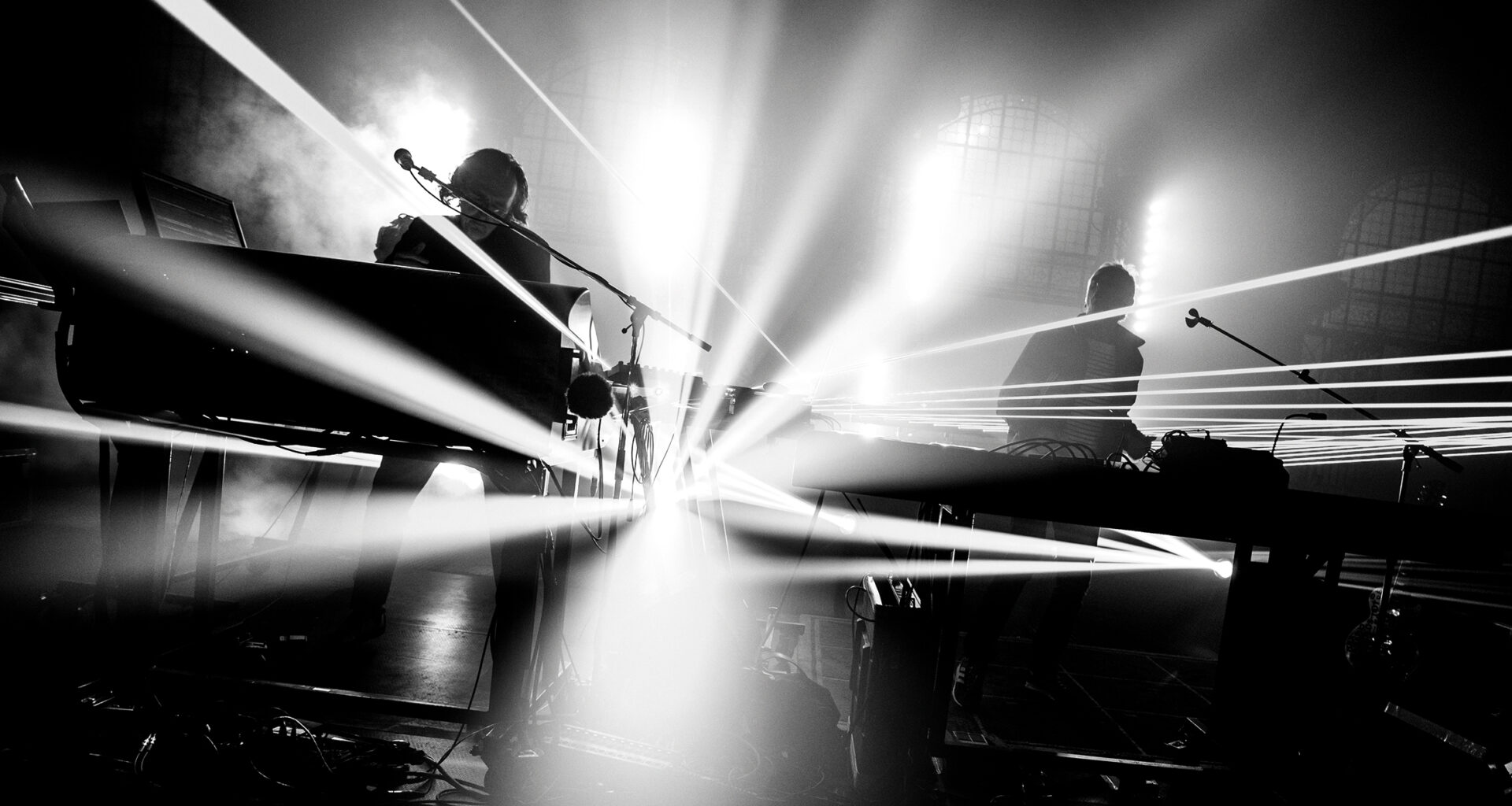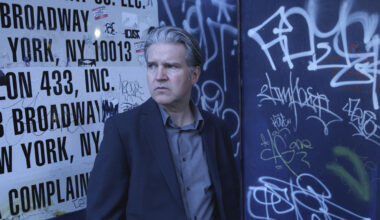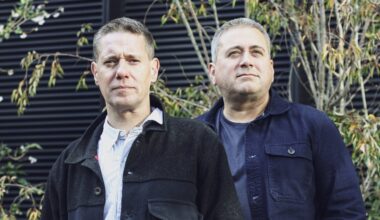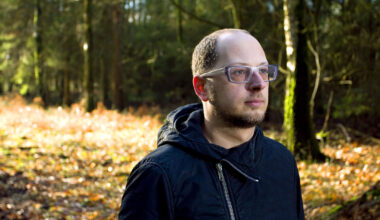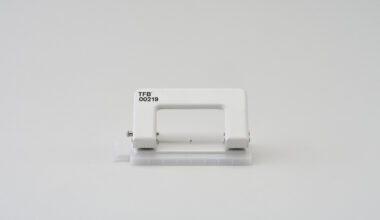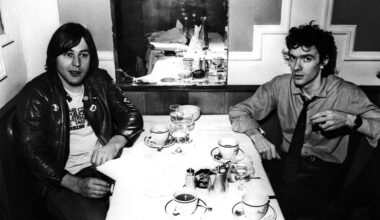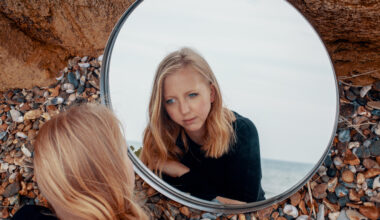It’s been a frantic couple of years for Underworld since their acclaimed ‘Barbara Barbara, We Face A Shining Future’ album came out in 2016 and there’s no sign that Karl Hyde and Rick Smith are easing up. We visit the group’s remote rural HQ to talk about their exciting new World Of Underworld project and find out how they’re using sounds and words and pictures to carve out a unique role as 21st century storytellers
“When I open a can of beans, I want to know there’ll be beans in there. I don’t want to open a can of beans and find that it’s spaghetti or perhaps even pineapple.”
Rick Smith, his Welsh accent as strong as it was the day he left the land of his birth more than three decades ago, has a point. I don’t think anybody would argue with him. Except Karl Hyde.
“We should be in the business of surprising and delighting people,” says Karl. “It’s like not putting ‘Born Slippy’ on the ‘Second Toughest In The Infants’ album. People were saying, ‘That’s mad! Are you insane?’.
Well, yes, but we’re not doing it. There’s not enough of that, not enough records that make you think, ‘I don’t know what’s going to happen next’. I want to hear an album where I don’t like track five, but in six months time I’ll be going, ‘Oh, track five, yeah, that’s my favourite’.
“That sort of thing happens to me so often. The number of times Rick has done a remix of one of our tracks and I just don’t get it… but then we’ll be in a club somewhere and something will come on and I’ll be saying to Rick, ‘This is fantastic, I love this, if we ever did a track with a guitar like that, this is exactly what I’d like to do’, and he’ll be looking at me going, ‘What the fuck are you talking about? This is us. This is that remix you hated’.
And I’ll be like, ‘Oh, shit, yeah, so it is’.”
“I just think you have to be considerate about it,” says Rick. “If you decide you want to express yourself in a particular way, then you should be able to do so. But I think that has caused us problems. Because we’ve always been very eclectic, it means people sometimes don’t know where we’re coming from, and it gets tricky when it comes to marketing things and selling things. So you do have to be clear with your audience. If we’re doing a show and we’re going to play ambient music without any beats for two hours, it would be rude in the extreme not to let people know that’s what was being proposed. It would not be polite, you know.”
So there you have it. Welcome to a world in which beans or spaghetti or perhaps even pineapple are sealed in unopened cans like some kooky version of Schrödinger’s cat experiment, but at least the labels clearly state, “May contain beans or spaghetti or perhaps even pineapple”. Welcome to the world of Underworld.
Bloody Underworld. I’m spending a few hours with the band at their base in the rural wilds of East Anglia, but I’ve arrived very late because the directions they’ve given me have taken me down a narrow lane that suddenly has a “Road Closed – Access Only” sign across it. I keep driving (of course), but I have to make a very awkward seven-point turn when I come upon a huge sinkhole.
Having eventually worked out another route to my destination, I’m a bit taken aback to discover that UWHQ is a collection of ramshackle huts in the middle of a field. And that’s not poetic licence. This is most definitely a field because it has a crop of some description growing in it. What’s more, the site is several miles from Arse End and several more miles from Nowhere. By the time I get here, I’ve been driving for so long that I’m sure I’m closer to Amsterdam than London.
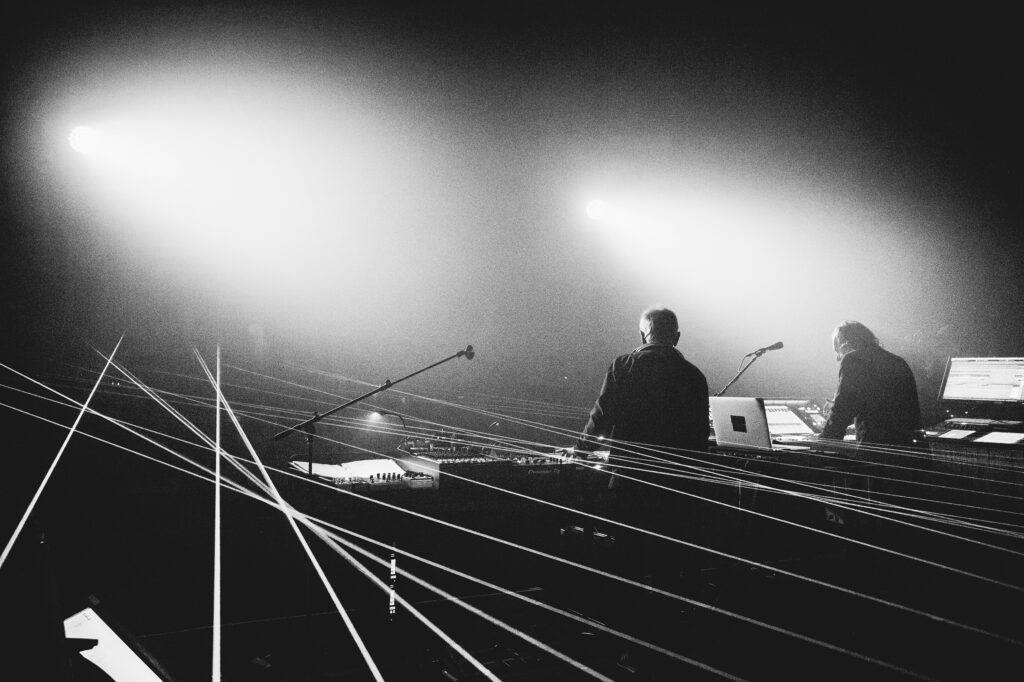
The nerve centre of Underworld’s operations are two squat buildings in the middle of the complex that were apparently originally constructed to house pigs. No, that’s not poetic licence either. In a small studio space in one of these former pigsties, Karl Hyde is sitting alongside a very battered mixing desk, his chair tipped back as he casually picks at one of his instantly recognisable letter-decorated guitars.
“Hello,” he says with a grin. “Been a while since we’ve seen you.”
Now here’s a funny thing. My visit to UWHQ comes precisely 30 years and three days since I first met Karl Hyde and Rick Smith. Underworld were a five-piece back then and were playing at The Marquee, which was in the last few months of its lengthy residence in London’s Wardour Street. They’d just released their debut album, ‘Underneath The Radar’, and I was there to review the gig for Melody Maker. I was introduced to them in the dressing room by someone from their record label. I was reasonably kind to them in the review, describing them as “grand and glossy” and ending by saying they were “an extremely marketable commodity”, but it’s clear that there wasn’t much in the way of tingling going on in my spine.
The next time our paths crossed was at the end of 1993, when Underworld were a completely different proposition. Karl and Rick were the only remaining original members and the pair had been joined by DJ Darren Emerson. They were preparing to release their ‘Dubnobasswithmyheadman’ album and I interviewed them at the offices of Tomato, the design company that Karl and Rick have long been associated with. I was still working for Melody Maker and this was the group’s first ever magazine cover story. I subsequently interviewed the band on three further occasions in the 1990s, the last time in 1998.
Despite the many moons that have come and gone since, Karl seems to have a very strong memory of my Melody Maker interview with them. Shortly before I leave UWHQ, he suddenly produces one of the countless little notebooks he’s used over the years to scribble down random thoughts and snatches of overheard conversations, many of which have subsequently turned up in Underworld’s lyrics.
“December 1993,” he laughs, raising his eyebrows and waving the notebook at me. “It’s all in here.”
It’s a couple of years since Underworld’s last album, ’Barbara Barbara, We Face A Shining Future’, and Rick is keen to play me some of the new material the group have been working on in recent months. Karl leaves us to it, popping across the yard to the other one-time pigsty, which these days houses a large live space for the band to rehearse in, while Rick hooks up his laptop.
“This first one’s a real basher,” he says as he clicks on his mousepad and pushes up the master volume on the mixing desk.
It is too. It’s a thumping acid track, with more squelches than a fisherman’s leaky welly. Rick says it features a Eurorack sequencer module called Stepper Acid, which is made by Transistor Sounds Labs in Staffordshire.
“It’s designed and built by these two female electronic musicians and it’s a fantastic little box,” he bellows, his head nodding and his right leg pumping away for all it is worth.
Next up on the laptop is a collaboration with London techno producer Ashley Burchett, who has been releasing records as Ø [Phase] on Token, the acclaimed Belgian label, for the last 10 years or so. It’s a much more subtle and supple track than the Stepper Acid tune, but Rick’s head and leg are nodding and pumping no less vigorously. When it’s over, we spend a little while talking about how the best techno music always has a soulful element to it.
The third and final track Rick plays me is ‘Brilliant Yes That Would Be’, which is something totally different again. In fact, it’s a short film as well as a piece of music, the mesmerising aerial footage of an icy blue and green glacial landscape having been shot by Simon Taylor from Tomato when he accompanied the band on a trip to Iceland earlier in the year. It’s an instrumental ambient piece, but it’s about as far removed from chill-out as you can get. It’s gripping and haunting, simultaneously beautiful and terrifying, and the piercing central motif – courtesy of a pair of Lyra-8 “organismic synthesisers” from Soma Laboratory in Russia – is huge and heavy and almost painfully loud. ‘Brilliant Yes That Would Be’ is wild, dangerous, edge-of-your-seat ambient music, the like of which I’m not sure I’ve ever heard before.
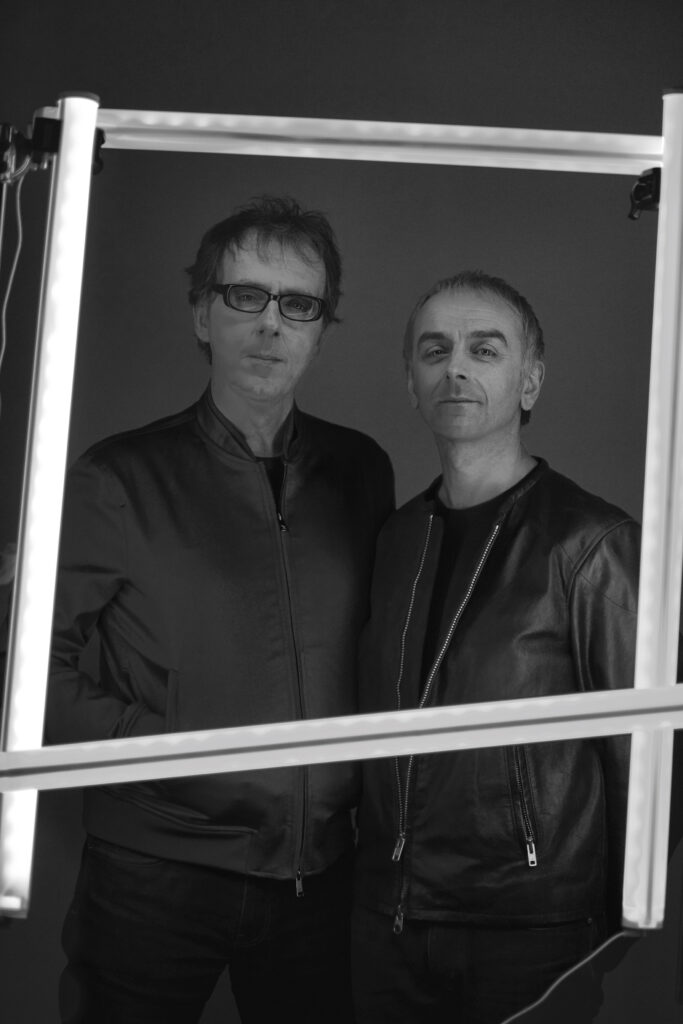
When it ends, I’m left feeling quite stunned by it. As Rick starts to talk about the piece, I’m struck by the level of his enthusiasm for all three of the tracks he’s let me hear today. When I ask him about this, he stresses the importance of being excited by the music he is making and notes how that excitement is the driving force of Underworld. As it happens, this is exactly the same thing he told me back in 1993. He uses pretty much identical words too.
“Really?” he says when I bring this to his attention. “That’s interesting. Wow. Hahaha. Oh, wait, no, hang on. That’s just one of those things that everybody in a band says, isn’t it? It’s obvious, it’s just blatant common sense, isn’t it? Ach, I don’t get any rewards for most of the shit I come out with, you know.”
A couple of weeks after my visit to UWHQ, the ‘Brilliant Yes That Would Be’ film suddenly pops up on YouTube. No pre-release publicity. No big announcement. Just a quick post on the band’s Facebook page and there it is.
Underworld have form for getting their music out there in novel ways. In 2007 and 2008, for instance, they recorded more than a dozen of their live shows and released them as limited edition albums, selling them to that night’s crowd and through the band’s website within minutes of each gig ending. The appearance of ‘Brilliant Yes That Would Be’ marks the start of another ongoing project. They’re calling it World Of Underworld and the seven-inch single that they are offering exclusively to readers of Electronic Sound – bringing together ’Twenty Three Blue’ (a track from the ‘Barbara Barbara’ sessions that has never been released in the UK before) and ‘Puppies’ (which featured on one of the ‘Pearl’s Girl’ remix CDs) – is also part of this new venture.
Now here’s another funny thing. Because depending on who you talk to in the Underworld camp – their manager, their press officer, even Karl and Rick themselves – you get a slightly different take on what World Of Underworld is all about. The central objective seems to be to make the group’s material available in new ways, most notably with themed playlists that can be accessed through the usual online streaming services. But when I ask Karl to explain the thinking behind it, he lets out a gentle sigh and says, “I’m a bit bemused by World Of Underworld”. He is kidding, but only a little.
“As far as I understand it in my naive way, it’s about trying to engage a wider audience in the breadth of the work we’ve done since the early 1990s,” continues Karl, after a little prodding. “Some of it people will know, but then there will be other stuff that’s a bit more esoteric. So there’ll be tracks from us as a two-piece, tracks from us as individuals, tracks from us as collaborators with other people, things from film scores, things from theatre projects, remix work, advertising work, music from art exhibitions, bits of spoken word, and so on. It’s reflecting the fact that Underworld is more than just an electronic group. Not wishing to big ourselves up, but we do take on an awful lot.”
“It’s not like we’ve really planned this thing and we know what it’ll look like in two year’s time,” adds Rick.
“It’s more about the process, what matters is the journey, but not knowing where we’re going is an important part of it for me. So while World Of Underworld looks like a goal, like something to aim for, we’re not saying, ‘Let’s go build that tower!’. And thinking in terms of playlists and streaming and the way that people listen to music now, there’s a really great opportunity for us because we have this body work we can draw upon in a way we couldn’t have done 20 years ago. In fact, nobody could have done it 20 years ago because the vehicle wasn’t there to enable you to do it.”
Rick is careful to stress that World Of Underworld isn’t just about their back catalogue. This is much more than a history project.
“It is taking advantage of our archive, but it’s not about the past,” he says. “It’s a response to the contemporary, which is why we also want to include lots of new material. We want to look at evolving some of our older tracks too and I think that’s really interesting. We did a recent show at the Rijksmuseum in Amsterdam, for instance, and we played this piece that uses the vocals of ‘Air Towel’ from ‘Second Toughest’, but it’s nothing at all like the original, it’s got a very different emotion. It was very exciting, it was such a buzz, you know. It’s intriguing to see how we can make new things like that start to happen.”
Was that the thinking behind ‘Slow Slippy’, the devilishly slurred and warped half-speed version of ‘Born Slippy’ on the ‘T2 Trainspotting’ soundtrack?
“Yes, absolutely, although that track has a very specific purpose,” replies Rick. “‘Born Slippy’ was very important to the original ‘Trainspotting’, so we were looking at how we could play around with that as a kind of reference to the first film. I used this very peculiar piece of software and it made it sound like nothing else, so I played it to Danny Boyle one day, you know, ‘Listen to this, it’s nuts’. I also played him what would happen if I interpreted the chords differently, because there are only two chords, it’s an incredibly simple track, and we found that it was very resilient. We hammered it out of shape, totally fucked it, and we ended up with a piece that was like an echo of the original rather than, ‘Oh, yeah, it’s that track again’.”
It’s Rick’s turn to disappear for a while, so Karl gives me a quick tour of the rest of the complex while we wait for him to return. Bearing in mind the discussion we’ve just had, I’m particularly interested in the band’s physical archives, which are housed in a series of rooms and corridors behind the studio space that we’ve been using for the interview.
There are racks and racks of tapes of all descriptions, including VHS tapes of The Screen Gemz, Karl and Rick’s very first band (one single, ‘I Just Can’t Stand Cars’ on Inflatable Records, in 1979). There are racks and racks of keyboards and computers, among them countless Apple Macs of all types and sizes and ages. What’s most striking is the fact that every single thing here, even down to the leads dangling from the pegboards, is tagged with a number. The fact this little lot is catalogued this way is impressive, that’s for sure, but I can’t help thinking it’s also slightly bonkers.
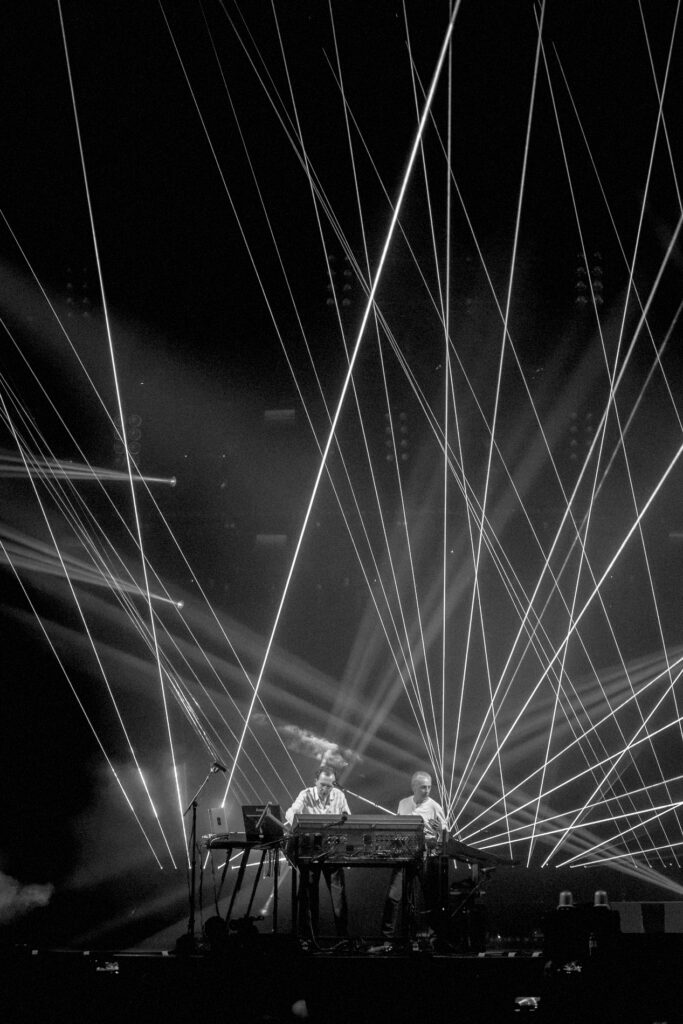
Along the way, Karl talks about all sorts. How he still hasn’t got over The Beatles spitting up (“I’ll go to my grave being mortified about that”) or The Police (“I was like, ‘Shit, it’s happening again’, and I know people might be horrified that I’d say that about The Police, but I saw that first tour they did and they were fantastic”).
How he’s currently fascinated with Bob Dylan (“I came to Dylan late, six or seven years ago) and when he’s not listening to Dylan he’ll most likely be listening to something on the Detroit Underground label (“They mostly only release modular, analogue material”). How he admires Eminem (“I mean, I can freestyle, I can improvise, but not like him”) and how he’s always loved Hawkwind, the space rock pioneers.
“Massively so. Hawkwind were the godfathers of acid house. And trance. Definitely trance. They took what was happening in Germany in the late 1960s, the early krautrock stuff, and turned it into something else. That phasing synthesiser was acid house, wasn’t it? To my mind, there’s a lineage from Hawkwind to a lot of electronic groups in the sense that they created a sonic landscape and it wasn’t necessarily about a frontman, it was about the voice just being there as an oscillator, and underneath it all there’s this relentless groove, taking you on a journey that just goes on and on and on.”
I’m not going to dispute any of this. I’m a huge Hawkwind fan myself. I have been since I saw them performing ’Silver Machine’ on ‘Top Of The Pops’ when I was 11 years old. I still haven’t recovered from that.
“’Silver Machine’ was such a great song,” says Karl. “I remember it coming out not that long before Kraftwerk’s ‘Autobahn’. With both of those records I was like, ‘Wow, this has got nothing to do with anything else around, what planet do these people come from?’. Those two records changed my life, no question about it.”
“It was Kraftwerk for me,” says Rick, who has joined us back in the studio. “There I was, 21-year-old Richard Smith in Cardiff, in Wales, with Kraftwerk on my Walkman… That was it, man. It was all over for me at that point. I’ve always loved electronic music and repetitive beats and sound design… And that moment when Kraftwerk came into my life, oh my God, I can still taste it in my mouth. I can still taste it even now.”
I want to talk some more about ‘Barbara Barbara, We Face A Shining Future’, which I reckon is Underworld’s best album since ‘Second Toughest In The Infants’ in 1996. Which isn’t to say that there aren’t some terrific moments on ‘Beaucoup Fish’ (1999), ‘A Hundred Days Off’ (2002), ‘Oblivion With Bells’ (2007) and ‘Barking’ (2010), but none of them truly zinged the way that ‘Dubnobasswithmyheadman’ and ‘Second Toughest’ did. Of course, it didn’t help Underworld that they’d set such a ridiculously high bar with those two albums.
So what happened with ‘Barbara Barbara’? Whatever it was, the effect on Karl and Rick was plain for all to see. I remember watching them being interviewed on the sofa of ‘BBC Breakfast’ when the album came out and they were clearly overjoyed to be back in the studio together for the first time since recording the soundtrack for Danny Boyle’s stage adaptation of ‘Frankenstein’ in 2011. They’d focused on separate projects in the interim years, Rick most notably as Boyle’s musical director for the London 2012 Olympics opening ceremony and Karl working as both a solo artist and as half of Eno Hyde with Brian Eno.
“I know some people were wondering what would happen when we got back in a room together,” laughs Karl. “I mean, they literally put us in the room, shut the door, and ran. They were like, ‘We might see blood coming out under the door, but whatever happens they won’t come out smiling’. But we did come out smiling.”
“There was definitely a real happiness at the heart of ‘Barbara Barbara’,” agrees Rick. “Right from the first day, it really surprised me just how much I enjoyed myself. And all the days we worked together were like that. All of them.”
There’s no question that ‘Barbara Barbara’ re-energised Underworld and set them on the path they are on now. They’ve certainly had a frantic couple of years since the album came out, particularly with their Street Poem project, which saw the group working with the Manchester Homeless Partnership to create an installation featuring the stories of homeless people for the Manchester International Festival 2017. Karl painted the stories, which were collected over the course of many months, on the walls of a disused shop in the city and the installation was accompanied by a soundtrack by Rick.
As it happens, MIF17 was doubly frantic for Karl because it also hosted the premiere of ‘Fatherland’, a stage play based on interviews with sons and fathers which he created with theatre producer Scott Graham and playwright Simon Stephens. ‘Fatherland’ begins a four-week run in London at the end of May and the dialogue of the play, rather like the Street Poem stories, has been put together in a way not dissimilar to how Karl writes Underworld’s lyrics.
“Both of those projects are about helping people to tell their stories,” says Karl. “I think that’s really important, especially with Street Poem, which was about showing people’s identities, so they weren’t simply faceless, they weren’t just ‘the homeless’. And actually, yeah, I think telling stories is also what we’re doing with Underworld. There was a point during ‘Fatherland’ when it dawned on me that Underworld are a folk group…”
Rick casts his partner a sudden sideways glance.
“It’s true. Underworld are a folk group. That’s what we are. We’re using machines rather than acoustic instruments, but we tell the stories and the legends of the people and the lives lived on this island.”
Rick is nodding now.
“Actually, I wouldn’t necessarily disagree with that,” he says.
Bloody Underworld. I’ve spent the best part of three decades trying to unravel what they are all about. I’ve always thought they stood apart from their fellow 1990s electronic superstar contemporaries. I’ve always thought their music elicited a far wider and deeper emotional response than that of The Prodigy or The Chemical Brothers or Leftfield. Even Orbital. I’ve always known they weren’t simply an electronic music group. Come on, we’ve all known that, for goodness sake. But a folk group? Blimey.
As ever with Underworld, there’s so much more to ask and so much more to tell.
“At the moment, I’m writing more than I’ve possibly ever done before,” says Rick. “I don’t mean spending more time in the studio, churning stuff out, I mean writing something and then quickly moving on because I want to get on to the next thing, I want to get on to something else, something different, something new.”
Why do you think that is?
“I don’t know. Time of life maybe.”
Speaking of which, how are your energy levels?
“As soon as Rick drops the first kick drum, it honestly doesn’t matter what state I’m in, it’s like I can’t help myself,” says Karl. “I remember going on stage one night in Poland, it was three o’clock in the morning and we were in the middle of some field somewhere, and my body is going, ‘You are fucking kidding me, right?’. I’m walking up the steps to get on the stage and I’m going, ‘Nope. Not tonight mate. Ain’t happening tonight mate’. Then Rick drops that kick drum and the next thing I know it’s 90 minutes later and I’m screaming, ‘Is that it?! Come on!!’ at the top of my voice.”
That’s some strong voodoo you’re working there, Rick.
“The story’s getting weird now, don’t you think?” he grins. “I mean, 37 years we’ve been working together, Karl and I. Underworld is odd. It doesn’t make sense, man.”
“It’s still amazing to us that anybody supports us,” adds Karl. “No, that’s true, that really is true.”
“But we’ve done OK, haven’t we?” notes Rick. “We’re still here, aren’t we? We’re still here, man. I mean, we aren’t exactly ABBA, we haven’t had 30 hit records, we haven’t got great coffers full of gold… But we are still here.”
“What it all comes down to it, well, I just really, really, really, really, really like what Rick does,” says Karl. “Working with him very often brings me to a place where it’s quite painful, because you find yourself reaching a line you don’t normally cross. This is the bit where you want to give up. This is the bit where you sit down and turn the telly on. This is the bit where you go, ‘I can’t do any more with this, I’ve gone as far as I can’. But Rick will be like, ‘Really? Well, you haven’t got a choice. Do it. Find a way through it and don’t do it like somebody else would do it’. I’ll be like, ‘God, it’s really hard!’, but that’s it. That is it. It is really hard. That’s the brief. And you do it because you’ll only piss Rick off if you don’t.”
“I like what Karl does too,” says Rick.
For more info go to underworldonline.com
